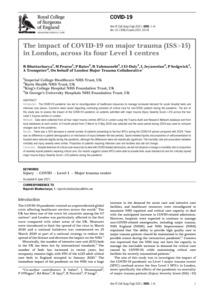Bhattacharya, R; Pearse, M; Bates, P; Tahmassebi, R; El-Daly, I; Jeyaseelan, L; Sedgwick, P; Trompeter, A; London Major Trauma Collaborative
(2022)
The impact of COVID-19 on major trauma (ISS>15) in London, across its four Level 1 centres.
Ann R Coll Surg Engl, 104 (6).
pp. 437-442.
ISSN 1478-7083
https://doi.org/10.1308/rcsann.2021.0218
SGUL Authors: Trompeter, Alex Joel
![[img]](https://openaccess.sgul.ac.uk/114042/1.hassmallThumbnailVersion/4MTC%20COVID.pdf)  Preview |
|
PDF
Published Version
Available under License ["licenses_description_publisher" not defined].
Download (183kB)
| Preview
|
Abstract
INTRODUCTION: The COVID-19 pandemic has led to reconfiguration of healthcare resources to manage increased demand for acute hospital beds and intensive care places. Concerns were raised regarding continuing provision of critical care for non-COVID patients during the pandemic. The aim of this study was to assess the impact of the COVID-19 pandemic on patients admitted with major trauma (Injury Severity Score >15) across the four Level 1 trauma centres in London. METHODS: Data were collected from all four major trauma centres (MTCs) in London using the Trauma Audit and Research Network database and from local databases at each centre. A 2-month period from 5 March to 5 May 2020 was selected and the same period during 2019 was used to compare changes due to the pandemic. RESULTS: There was a 31% decrease in overall number of patients presenting to the four MTCs during the COVID-19 period compared with 2019. There was no difference in patient demographics or mechanism of injury between the two periods. Sports-related injuries and proportion of self-presentation to hospital were reduced slightly during the pandemic, although the differences were not statistically significant. The mortality rate and association between mortality and injury severity were similar. Proportion of patients requiring intensive care unit facilities also did not change. CONCLUSION: Despite diversion of critical care resources to deal with COVID-related admissions, we did not observe a change in mortality rate or proportion of severely injured patients requiring critical care. Our results suggest London MTCs were able to provide their usual standard of care for critically injured major trauma (Injury Severity Score >15) patients during the pandemic.
Statistics
Item downloaded times since 20 Jan 2022.
Actions (login required)
 |
Edit Item |



